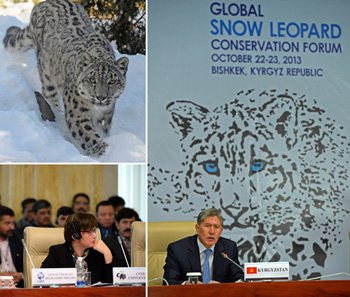Bishkek, Kyrgyz Republic
October, 2013
Statement of John E. Scanlon, Secretary-General, CITES
President Atambayev, President of the Kyrgyz Republic.
Vice Prime Minister, Sarpashev, Chair of the Forum Organizing Committee.
Distinguished delegates from across the 12 Range States of the snow leopard.
Friends and colleagues from intergovernmental and non-governmental organizations, and in particular the Forum co-organizers.
-----

It is a great honour to be able to address you today and I deeply regret that I am unable to join you in person. I am however pleased to advise you that Pia Jonsson of the CITES Secretariat is there with you in Bishkek.
We would like to sincerely thank the President and Government of the Kyrgyz Republic for their leadership in hosting this extremely important Forum.
The survival of the snow leopard in the wild is under severe threat. These threats include the poaching and illegal trade in the fur and other body parts of this magnificent animal. It must be stopped and it is within our power to stop it.
CITES is the preeminent global legal instrument for regulating international trade in wildlife and it serves to both intercept illegal trade and to facilitate legal, sustainable and traceable trade.
Today there are 179 Parties to CITES, which includes 11 out of the 12 Range States of the snow leopard, and we understand the 12th Range State is in the process of acceding to the Convention.
The snow leopard has been included on Appendix I of CITES since 1975, which offers it the highest level of protection under the Convention. All international trade that is primarily for commercial purposes is prohibited under CITES. The Convention imposes obligations on source, transit and destination States in recognition of the fact that implementing CITES requires a collective effort.
Earlier this year at the 16th meeting of the Parties to CITES held in Bangkok, Thailand, we were instructed by our Parties to provide further support to our Parties in implementing the Convention, which included providing support for:
- Better recording information on the poaching and illegal trade of snow leopards across the 12 Range States;
- Enhancing national legislation to more effectively implement CITES;
- Strengthening national and regional enforcement measures, recognizing the need to take a multidisciplinary approach – and in this regard we are providing significant support to Range States and to regional enforcement networks through the International Consortium on Combatting Wildlife Crime, known as ICCWC, an initiative of the CITES Secretariat, INTERPOL, the UN Office on Drugs and Crime, the World Bank and the Worlds Customs Organization.
- Finally, we were asked to assist States to reduce demand through raising public awareness.
All of these activities are well underway and we look forward to continuing to work with you in implementing them.
The threats to the snow leopard are many and varied and CITES warmly welcomes the holistic approach that is being taken through the programme you have before you today.
We offer our full support to assisting you in implementing your programme, within the scope of our mandate and resources. We also recognize that the international community at large stands behind you and we note the presence of colleagues from the UN Development Programme, the Convention on Migratory Species, the World Bank and others all expressing solidarity with you as we move to implement your programme.
CITES was adopted in 1973 in Washington D.C., forty years ago. It is interesting to reflect upon the founding text of the Convention, which recognizes that peoples and States are the best protectors of their own fauna and flora.
We congratulate you and warmly welcome this excellent initiative of the 12 Range States and the peoples of the Range States. We again thank the President and the Government of the Kyrgyz Republic for their leadership and we wish you a highly successful meeting.
Once again, we stand ready, as a part of the international community, to support you in implementing your programme.
Thank you again for giving me the opportunity to address you today.
See also: